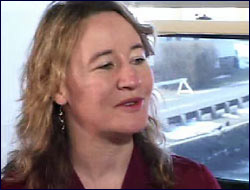|
|
Professor of
Molecular Biology and Genetics, Johns Hopkins University
http://www.hopkinsmedicine.org/pharmacology/
pages/faculty/greider.html
"There’s
clearly something going on in terms of women’s advancement
in the higher ranks of science," says Carol Greider. Greider,
now a professor of molecular biology at Johns Hopkins University,
began her work under the mentorship of Liz Blackburn at Berkeley.
She’s noticed that only about ten percent of the upper echelons
of genome research are women, even though the gender ratio is about
fifty-fifty at the graduate level. "I don’t think the
reasons for this are so simple as women not getting recognition,"
she says. "There are more subtle, societal issues that go on
that contribute to this."
Role models are important, she says, but not as vital as someone
opening the doors of opportunity for female students. "I don’t
think it’s so important necessarily to have a woman mentor,"
she says. "What's important is to have a mentor that promotes
women’s careers."
Greider had some inspiring role models, though. Among them was the
Nobel-winning Barbara McClintock, whose research was in a similar
area as Greider’s when Greider arrived at Cold Spring Harbor
Laboratory in 1988. She reminisces about those days. "I would
see her walking around the laboratory," Greider remembers.
"It was a number of months, probably closer to a year, to get
the courage up to actually go up to her and talk to her, because
I really did feel like I wanted to have something important to say
before going to talk to this amazing person."
Both Greider and McClintock were doing what most researchers do
at Cold Spring Harbor: basic science. There are two ways of approaching
research, Greider explains. Taking cancer as an example, one can
study specific diseases, or investigate the general functions within
cells. Those general explorations are vital, she says, because "by
curious people following up lines of research, unexpected discoveries
occur that turn out to have implications." The fact that Cold
Spring Harbor is largely—and uniquely—devoted to this
"curiosity-driven" research means the environment emphasizes
the importance of exploration. "It feels like coming home here,"
she says, "because those points are made time and time again."
|
|

|

|

|
"If you have a new and exciting
discovery and you walk down the hall, you want to tell someone.
And who do you run into? You want to run into people that are
going to be excited about that discovery."
|

|

|

|

get
free real player
get
help
|
|

